Do Beauty Standards Fuel Income Inequality? Study Finds Women Who Wear Makeup Earn More Money

Most of us wake up in the morning and hit the snooze button a few times, only to realize we have just enough time to take a 5-minute shower and throw our clothes on before sprinting out the door. Needless to say, our zero-effort, just-got-out-of-bed look may not be the most ideal, but if we get our work done we should be good — or so we think. According to a recent study published in the journal Research in Social Stratification & Mobility, spending a few extra minutes grooming could make the difference between how much we get paid to work, regardless of our job performance.
Previous research has found people who are considered physically attractive have many advantages in life. For example, a study published in the journal the American Economic Review revealed attractive people are more likely to be hired and promoted in the workplace, and end up with higher wages. However, University of California, Irvine sociology alumna Jaclyn Wong and associate professor Andrew Penner wondered: when it comes to physical attractiveness and grooming, what is the difference, and how can both influence the salaries we earn?
Wong and Penner analyzed data previously gathered on 14,600 adults during the National Longitudinal Study of Adolescent to Adult Health, which tracked a nationally representative sample of people from childhood to adulthood. The participants were in grades seven to twelve when the study began in 1994, and were ages 24 to 32 when researchers last followed up with them in 2008. They sat down for interviews, and at the end of each talk, the interviewers rated the attractiveness of the participants as either unattractive, average, attractive, or very attractive. Moreover, the interviewers rated whether they found the participants to be poorly groomed, of average grooming, well groomed, or very well groomed.
As adults, the participants provided information about their yearly salary. A gender income gap was apparent in that on average, the men reported earning $7,000 more than the women. Overall, attractive people earned about 20 percent more money than “average” people. Now, when the researchers compared people of the same level of attractiveness to each other, well-groomed people earned more money than poorly groomed people.
"For both men and women, grooming matters more than attractiveness: Being attractive is not enough; it is doing attractiveness appropriately that proves one's deservingness and is what gets rewarded in the labor market," wrote Wong and Penner, in the study.
The distinction between attractiveness and being well groomed surprised the researchers. Typically, we think about attractiveness as either something we have or we don’t. We’re either attractive or we’re not. However, when it comes to employment, “what matters is not your innate attractiveness but rather how you present yourself.” said Penner, in a statement.
However, why is this the case?
This primping could be interpreted as a “signaling device,” speculates The Washington Post. In other words, spending all this time and money grooming could signal to our employers that we are aware of social cues and we take into consideration how other people perceive us. This translates to good social etiquette in the workplace.
Wong and Penner wonder why these practices are more important for women than men. One is that these gender differences are the result of a cultural tendency to monitor women’s behavior more than men’s in ways that keep women distracted from really achieving power. Wong refers to Naomi Wolf, a third-wave feminist who believes women are encouraged to pursue “the beauty myth,” or society’s unrealistic standards of beauty for women as a way to control and constrain their behavior.
Other research suggests the grooming effect applies to men too. A 2009 study found more time spent on grooming is linked with higher wages for men in minority groups. The researchers also uncovered excess grooming, spending more than 90 minutes a day, had a negative effect on wages for women. This could signal people may be more focused on their appearance than their jobs.
So, how much effort should we put into our appearance?
However long it takes to feel beautiful in our own skin.
Source: Wong JS and Penner AM. Gender and the returns to attractiveness. Research in Social Stratification and Mobility. 2016.
Published by Medicaldaily.com



























